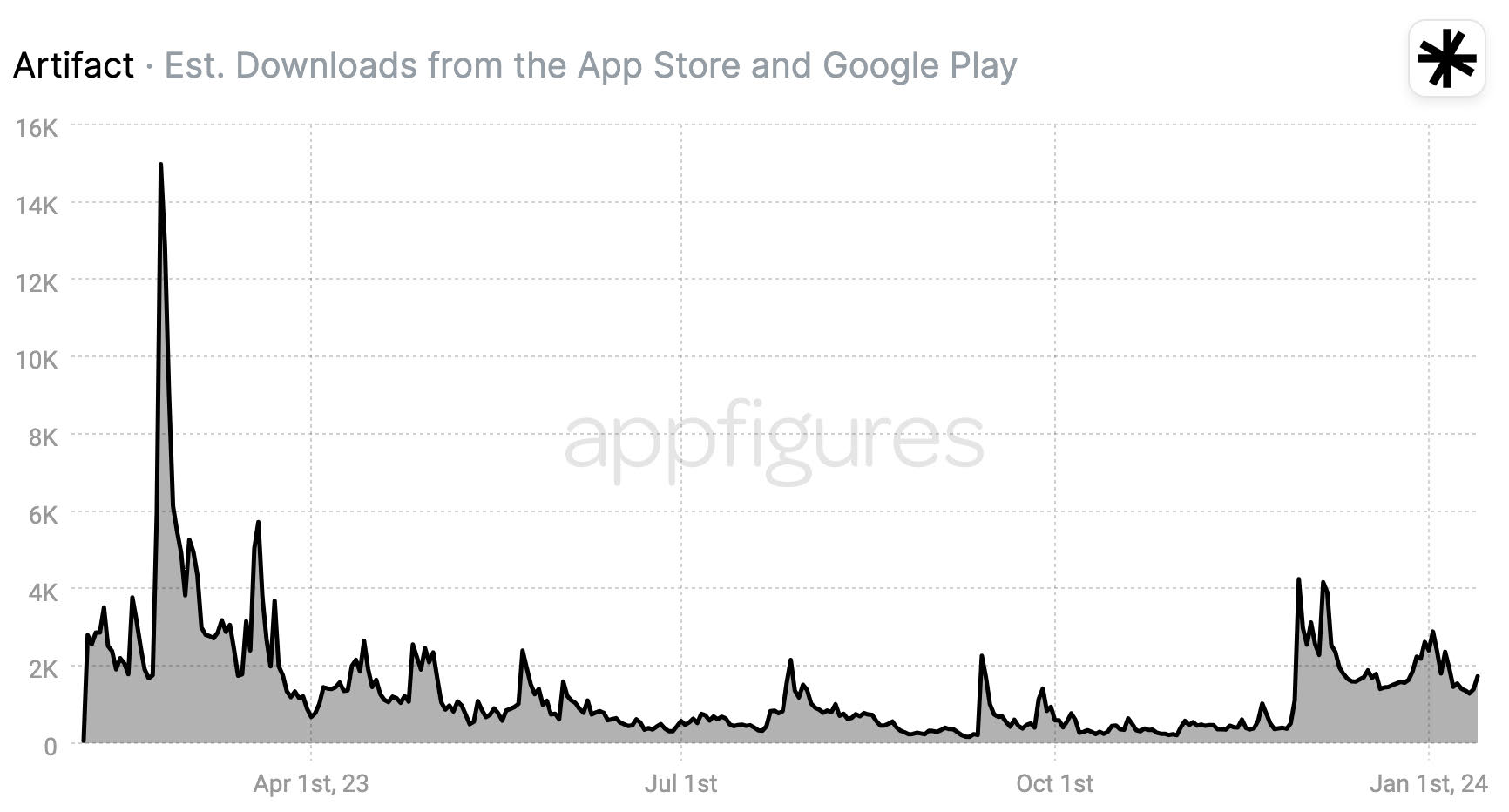Last week, Artifact, a buzzy news app from Instagram’s co-founders, announced it was shutting down after failing to gain critical mass. The news came as a surprise, as the app was generally well-received by its core audience; smartly leveraged AI to power recommendations, summarize news, and rewrite clickbait; and featured a clean and modern design that made it easy to use. So what went wrong?
New data indicates that Artifact couldn’t catch up to the competition and struggled to grow its user base outside the U.S. It also saw downloads of the app steeply dropping off after launch, indicating a failure to catch on with a more mainstream audience.
In a company blog post, Instagram and Artifact co-founder Kevin Systrom had explained that the decision to shut down the app came about because they realized the market opportunity wasn’t large enough to warrant continued investment. It was a tough call, he said, but making that call “earlier is better for everyone involved.”
It’s rare to see a startup throw in the towel so soon, but particularly among an app that appeared from the outside to have traction. Posts on the app — generally news articles and links to other interesting finds from around the web — offered social features, allowing users to like and comment. Based on in-app activity, it appeared as if Artifact had built a following, as many posts included active discussions filled with comments and often featured thousands of “reads” (views). In addition, many of the app’s creators — meaning those who contributed content to the app as journalists or curators of links — also had hundreds of followers.
When you participated in Artifact’s community, it didn’t feel like shouting into a void. That’s an experience even larger apps, like X (originally Twitter), can’t always reliably deliver. In Artifact, people were browsing their feeds, reading headlines, socializing, following others, and marking items to read later. Much of this activity was visible to other users, making the community feel alive.
Unfortunately, the reality is that Artifact didn’t gain ongoing interest after its initial debut, so it was this core community keeping it afloat.
According to data from app intelligence provider Appfigures, Artifact saw an estimated 444,000 downloads since its February 2023 launch. However, a large part of those downloads, just under 100,000, arrived around its launch. By October 2023, the app had stalled, with only 12,000 new installs. In late November and early December, there was a brief spike again — perhaps a final push from Artifact’s team before making the decision to shut down. But that didn’t save the app from its fate.

Another issue facing the app was the stiff competition. Though rival news aggregator SmartNews was also losing downloads and active users at the time, in addition to its CEO shake-up, it still managed to pull in far more users than Artifact. During the time that Artifact was on the market, SmartNews saw 2 million downloads. Artifact had less than a quarter of that figure.
The app also had to compete with new ways people are getting their news in the age of AI, where search engines and chatbots are delivering information and answers without the need to click on links or read long news stories. That’s something that’s impacting web publishers’ traffic, leading outlets like The New York Times to sue AI company OpenAI for training on its content. Other publishers, like Axel Springer, are instead licensing their content to OpenAI for a fee, hoping to get ahead of where the market is moving. For consumers, this means there may be lessened demand for a secondary news app to complement their smartphones’ built-in newsreaders, like Apple News or Google News.
Artifact also struggled to gain an international following, which could have helped it thrive even if U.S. downloads stalled. Appfigures found that the U.S. accounted for 44% of all the app’s downloads. Meanwhile, no other country had more than a 4% share. That indicates that the name recognition of Artifact’s famous founders — Kevin Systrom and Mike Krieger, who created Instagram — may not have had as much draw outside the tech scene within their home market here in the U.S.
Then there was the issue around Artifact’s ever-growing set of features, which began to dilute its sharp focus on delivering a better, AI-powered news reading experience. All of a sudden, the app was allowing users to post their links, similar to Pinterest, followed by an ability to post text content, like on Twitter/X. Soon after, it added an option for sharing places, turning Artifact into a recommendations engine for the real world. That then begged the question as to what Artifact wanted to be — was it a social news reading app or just a social network? By adding more functionality, Artifact may have potentially confused users as to when or why they should use it.
The company also continued to dabble with the latest AI tools, like a generative AI feature for adding images to posts or AI summaries in fun styles like “Gen Z speech,” “explain like I’m five,” or even just emojis. It began to seem as if the team wanted to build a new app entirely, like a new social network — perhaps an AI-powered Instagram? An Instagram for news? This also left some wondering if Artifact was now just a playground for the founders to try out the latest tech or if it had a planned roadmap.
Artifact was originally self-funded by the co-founders in the single-digit millions. This could be another reason why they decided to cut their losses earlier than expected. They may not have wanted to get into the position of raising funds from investors that they could fail to deliver returns on.
In any event, Systrom hinted that Artifact’s end may not be the end of his return to the world of tech startups, noting in the blog that he was “personally excited to continue building new things, though only time will tell what that might be.”
Based on Artifact’s progress, it seems like they have plenty of ideas to choose from.
Instagram co-founders’ news aggregation startup Artifact to shut down































Comment